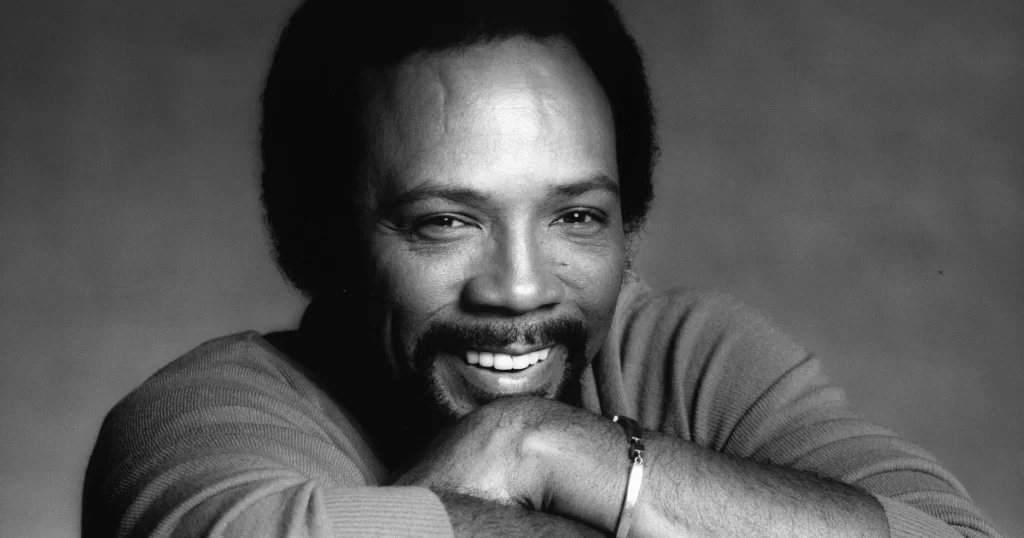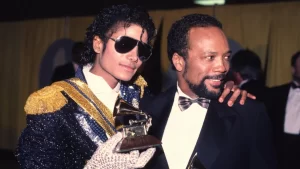
Quincy Jones, the legendary American musician and producer renowned for his collaborations with icons such as Michael Jackson, Frank Sinatra, and Ray Charles, has passed away at the age of 91. His publicist, Arnold Robinson, confirmed that Jones “passed away peacefully” on Sunday night at his home in Bel Air, California.
In a heartfelt statement, Jones’ family expressed their sorrow: “Tonight, with full but broken hearts, we must share the news of our father and brother Quincy Jones’ passing. Although this is an incredible loss for our family, we celebrate the great life that he lived and know there will never be another like him.”
Jones was best known for producing Michael Jackson’s Thriller, the best-selling album of all time, which sold over 34 million copies in the United States alone. Over a remarkable career that spanned more than 75 years, he won 28 Grammy Awards and was recognized as one of the most influential jazz musicians of the 20th century by Time magazine.
His work with Frank Sinatra was particularly notable; Jones reimagined Sinatra’s classic “Fly Me to the Moon,” transforming it from a waltz into a lively swing number. Jones’ collaborations extended beyond jazz, influencing pop, soul, and film music. He first teamed up with a young Michael Jackson during the production of the film The Wiz, which marked the beginning of a legendary partnership. Together, they produced not just Off the Wall but also the albums Thriller and Bad, solidifying Jackson’s status as a global superstar.
In 1985, Jones brought together an impressive lineup of 46 of America’s top artists, including Jackson, Bruce Springsteen, Tina Turner, and Cyndi Lauper, to record “We Are the World.” Co-written by Jones, the song aimed to raise funds for victims of famine in Ethiopia and became a cultural phenomenon, reaching number one on the charts in both the UK and the US. This project mirrored the impact of Band Aid’s “Do They Know It’s Christmas?” and remains one of his most celebrated achievements.

Beyond music production, Jones composed the soundtracks for over 50 films and television shows, including the classic 1969 British film The Italian Job. Michael Caine, who starred in that film, paid tribute to Jones on social media, calling him “a titan in the musical world” and expressing gratitude for having known him.
Tributes poured in from across the entertainment industry following the news of his passing. Sir Elton John lauded Jones, stating, “Nobody had a career as incredible as him. He played with the best and produced the best. What a guy. Loved him.” Television producer Shonda Rhimes praised him as “a legend, a visionary, a pioneer.”
Jones also produced the critically acclaimed film The Color Purple, which introduced audiences to Oprah Winfrey and Whoopi Goldberg. Goldberg reflected on Jones’ unique contributions, calling him “one of a kind” in a heartfelt tribute on Instagram.
In television, Jones was instrumental as a producer of the hit show The Fresh Prince of Bel-Air, further showcasing his versatile talents across various entertainment mediums. His accolades extended beyond music, earning him recognition at the Emmys, Tonys, and Oscars.
Jones was married three times and fathered seven children, including music producer Quincy Jones III and actress Rashida Jones, known for her role in the US version of The Office. His family described him as “truly one of a kind,” emphasizing that “through his music and his boundless love, Quincy Jones’ heart will beat for eternity.”
Playwright Jeremy O’Harris remarked on X that Jones’ “contributions to American culture were limitless,” highlighting that he was the first Black person nominated for an Oscar for Best Score. Rapper LL Cool J, who briefly dated Jones’ daughter, expressed his gratitude for Jones’ mentorship, stating, “You gave me opportunities and shared wisdom. Music would not be music without you.”
Musicians and fans alike shared their memories and admiration, with Victoria Monét proclaiming that Jones’ “legacy will live on forever,” while Nile Rodgers and Ice-T both honored his genius and influence on the music industry. Montreux Jazz Festival CEO Mathieu Jaton noted that Jones’ spirit “will forever resonate” with the festival’s history, crediting him with elevating the festival to new heights during his involvement in the 1990s.
Quincy Jones’ legacy is undeniably vast, leaving an indelible mark on the music industry and popular culture. His contributions to music and his impact on countless artists will be celebrated and remembered for generations to come.






